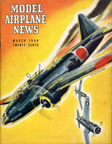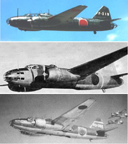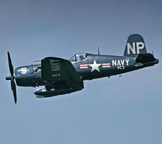March, 1944

Mitsubishi OB-01 (G4M) "Betty"
Model Airplane News Cover Art for March, 1944
by Jo Kotula
Click to Enlarge
The Mitsubishi G4M or Ichishiki rikujo kogeki ki, Isshikirikko ("Type 1 land-based attack aircraft") was the main twin-engine, land-based bomber used by the Imperial Japanese Navy Air Service in World War II. The Allies gave the G4M the identification name of Betty.
The G4M was designed for long range and high-speed at the time of its introduction. Consequently, weight saving measures were incorporated into the design, such as dispensing with self sealing fuel tanks, which caused Allied fighter pilots to give it the derisive nicknames "one-shot lighter", "flying Zippo" and "flying cigar". Similarly, pilots of the Imperial Japanese Navy called the G4M the "Type One Lighter" and "Hamaki" ("Cigar"). This was due to the fact that on many occasions, it was used for low-altitude torpedo attacks where its performance advantages were negated. The "Betty"'s relatively-large size made it a large target to shoot at, and the simplified approach path on a torpedo run to attack a ship, meant for a generally easy interception. The cover art depicts a Betty being shot down by two Vought F4U Corsairs.


Photos of the Mitsubishi OB-01 (G4M) "Betty"
.. and her nemesis, the Vought F4U "Corsair"
Click to Enlarge
When used for medium- to high-altitude bombing against stationary targets like a supply depots, seaports, or airfields, "ease of interception" was another matter entirely. Using its long range and high speed, the G4M could appear from any direction, and then be gone before many fighters could intercept them. The 20 mm cannon in the tail turret was much heavier armament than commonly installed in bombers, making dead astern attacks very dangerous. Sometimes, assuming they did not catch fire in the first place, G4Ms also proved to be able to remain airborne despite being badly shot up. For example, after 751 Kokutai's attack during the Battle of Rennell Island, three out of four survivors (of 11 aircraft that went to attack) returned flying on one engine only. Near the end of the war, the "Betty" was used as a common kamikaze-carrying and launching platform, and was the usual aircraft for carrying the Ohka kamikaze rocket aircraft.
Here is a video of the Mitsubishi OB-01 (G4M) "Betty" in action:
Click Here for more information about the Mitsubishi OB-01 (G4M) "Betty".

Click to go back and select another cover.
Counter for the Entire Site (not just this page..)
Home | About Lindy | Last Week's Reviews | Upcoming Events | 1940s Collecibles
The Guide - Establishments - Travel - Accessories
Music | Links | Photo Gallery | Extras | Contact